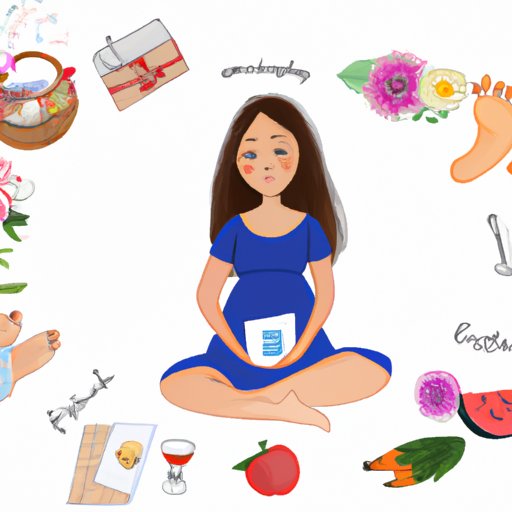
Introduction
As an expecting mother, you’ve probably heard about the importance of gaining weight during pregnancy. However, what many women don’t know is how much weight they should gain, and how to gain it in a healthy way. Knowing this information can positively impact both mom and baby’s health during and after pregnancy. In this article, we’ll explore the recommended weight gain based on pre-pregnancy body mass index (BMI), the potential risks of gaining too much weight during pregnancy, tips for healthy weight gain, the effects of pregnancy weight gain on the mother and baby, and personal stories from women who have navigated weight gain during pregnancy.
Recommended Weight Gain Based on Pre-Pregnancy BMI
Body Mass Index (BMI) is a measurement of body fat based on height and weight. It’s important to consider BMI when determining how much weight an expecting mother should gain during pregnancy. Here are the recommended weight gain ranges, according to the National Institute of Health:
- Underweight (BMI less than 18.5) – 28-40 pounds
- Normal weight (BMI 18.5-24.9) – 25-35 pounds
- Overweight (BMI 25-29.9) – 15-25 pounds
- Obese (BMI 30 or higher) – 11-20 pounds
It’s essential to keep in mind that weight gain during pregnancy varies from woman to woman. The exact amount of weight you should gain depends on various factors such as your height, pre-pregnancy weight, medical history, and genetics.
Potential Risks of Gaining Too Much Weight During Pregnancy
Although gaining an adequate amount of weight is crucial during pregnancy, gaining too much weight can lead to potential complications. One of these is Gestational Diabetes, a type of diabetes that may develop during pregnancy. It increases your risk of having a larger baby, which may lead to prolonged labor or the need for a cesarian section. Women who gain too much weight during pregnancy are also more likely to develop high blood pressure, which may lead to preeclampsia. Also, babies who are born to mothers who gained excessive weight during pregnancy are more likely to have a higher birth weight, macrosomia, making the delivery more complicated for both mother and baby.
Tips for Healthy Weight Gain During Pregnancy
The key to healthy weight gain during pregnancy is not gaining too little or too much weight. Here are some specific tips for pregnant women:
- Eat a healthy and balanced diet – including whole grains, fruits, vegetables, lean protein, and healthy fats.
- Eat smaller portions frequently throughout the day – aim for 3 main meals and 3 snacks.
- Stay hydrated – drink plenty of water and limit sugary drinks.
- Exercise regularly – ensure you’re getting moderate exercise at least 30 minutes a day, most days of the week.
- Get enough rest – get at least 7-8 hours of sleep per night.
Remember that every woman’s body is different, and what works for one woman might not for another. Consult with your healthcare provider to ensure a healthy approach to weight gain during pregnancy.
The Effect of Pregnancy Weight Gain on the Mother and Baby
The impact of excessive weight gain during pregnancy varies from woman to woman. Pregnant women who gain too much weight may experience physical complications such as increased back pain, varicose veins, and fatigue. Excessive weight gain during pregnancy can also have psychological effects, such as lower self-esteem, depression, and postpartum weight retention. On the other hand, not gaining enough weight can lead to poor nutrition and low birth weight for the baby.
Personal Stories of Women Navigating Weight Gain During Pregnancy
At some point during their pregnancy journey, most women struggle with weight gain. It’s essential to remember that you’re not alone in this. Here are some examples of stories from women who have faced this challenge:
- Andrea – “When I was pregnant, I gained weight quickly, and my doctor wasn’t pleased. I was so focused on eating for two that I wasn’t paying attention to the quality of food I was consuming. I began focusing on adding more fruits and vegetables to my diet and replacing the junk food with healthier options. It was a gradual shift, but it worked, and I had a healthy delivery.”
- Maritza – “I was on bed rest for most of my pregnancy, and I gained more weight than I anticipated. It was frustrating, but I talked openly with my doctor about it. She made me feel like I was not alone in this and that it wasn’t my fault. I focused on nutritional food, and I was able to lose the extra weight after delivery.”
- Julia – “I’m a plus-sized woman, and I’m used to being shamed about my weight. So when I became pregnant, it was tough. I thought I was eating healthily, but I wasn’t gaining enough weight. My doctor worked with me to develop a meal plan and helped me understand that gaining weight during pregnancy was crucial, and not something to be ashamed of.”
Conclusion
Gaining weight during pregnancy is essential for the health of both the mother and baby. However, gaining too much or too little has its potential risks. By focusing on healthy food choices, regular exercise, hydration, and good rest, you can ensure a healthy weight gain during pregnancy. Personal stories from other women and consultation with a healthcare professional can also provide support through your pregnancy journey. You’ve got this, mama.




